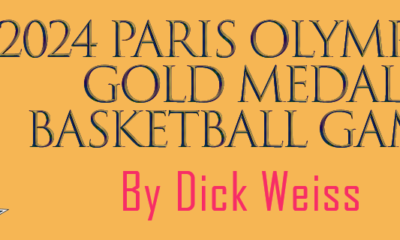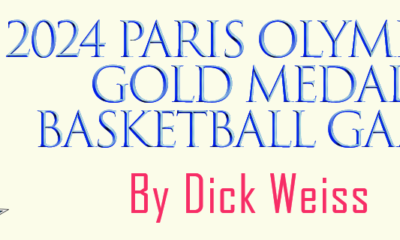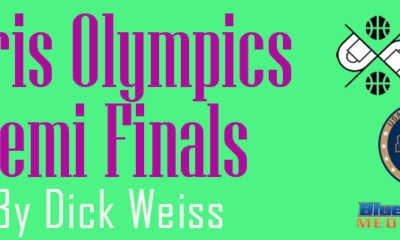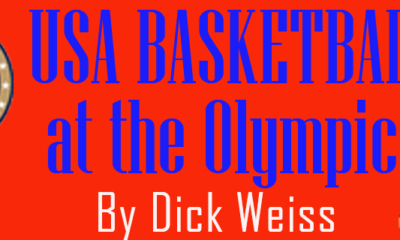LAS VEGAS– Paul George is back here at the UNLV’s practice facility this week, wearing a USA national team jersey. He is just steps away from the Thomas and Mack Arena where he suffered a gruesome compound fracture of his tibia and fibia in an exhibition game during USA Basketball Showcase on Aug. 19, prior to the 2014 FIBA World Cup in Spain.
It was the worst night of George’s career as he went from being a rising star and legitimate candidate to make the team to a hospitalized victim whose professional future was suddenly in jeopardy.
The scene is indelibly etched into the minds of anyone who was there. George, who simply refers to incident as “the injury,” chased down Harden to foul him on a fast break and snapped his left leg after landing awkwardly at the base of the basket stanchion that was located too close to the baseline. His heart wrenching screams were a constant reminder of the pain he experienced
George has made a miraculous recovery since then, coming all the way back to earn a spot on the 2016 Olympic team as one of the best two way players in the league. He is coming off a blockbuster NBA season. He was an All Star again, made the All Defensive team and was a third team All NBA player, averaging 23 points– more than he averaged the year before the injury–and appearing in 81 games while leading the Pacers back to the post season. George reminded a national TV audience just how talented he can be when he led Indiana within a game of upsetting the Toronto Raptors with Olympic teammates Kyle Lowry and Demar DeRozen in the NBA Eastern semi-finals.
“This is like a redemption to myself,” George said during this week’s Olympic mini-camp. “All the bad that happened to myself on that night, I owed it to myself to come back out here and compete for my country It was a bump in the road, literally. But it’s a game and injuries happen. It was a freak accident. Something that probably won’t ever happen again, knock on wood. This is what I do. I put myself in that position. It happened, it’s about how I return.”
When George was injured, the was a ground swell of opinion among some owners and some general managers to ban NBA participation in FIBA non-Olympic events and even during Olympic years. George, after all, is the Pacers’ highest paid player. But Indiana president Larry Bird, who played against the Russians in college, then finished up his career as a member of the 1992 Dream Team, has been in Vegas all week and is 100 percent behind USA Basketball. He wants George to experience what he experienced while playing for his country.
“It wasn’t even about the injury. I wanted to win a gold medal more than I wanted to come back and play because of the injury,” George said. “Yeah, the injury was something to do with it, but it doesn’t have everything to do with it. My only goal is to go over there and win the gold medal. Ever since watching the Dream Team, it’s just something all of the greats have been a part of.”
In the minds of Team USA managing director Jerry Colangelo and coach Mike Krzyzewski, George is one of the feel good stories of this Olympic team in a year where USA Basketball was forced to scramble to put together a dominant roster after elite players like LeBron James, Stephen Curry, Kawhi Leonard and Russell Westbrook took a pass from international competition.
Krzyzewski, who visited George in the hospital the night of the injury, has kept in constant touch with him and Colangelo offered George a spot on the 2016 Olympic team, provided he is healthy.
“Coach K has been with me the whole way- through rehab and last season,” George said. “He’s a jokster. He constantly texts me. He’s constantly putting me in the moment. He keeps saying, “Just think about standing on the podium holding that gold medal up. He would constantly remind me about that’s important.”
“It’s the best,” Krzyzewski said.”It’s one of those things that should be and god bless him for coming back from that injury. Physically, if you watch him play, holy mackerel. But emotionally, Jerry and I talked about how good we feel because he deserves to be on the team and he’ll make us better. It’s a good book. It’s one of those really good things.”
“It’s hard to really impress in detail,” Colangelo added. “We didn’t really know when he got hurt whether he would never be back, not just in terms of us or in terms of his career. So we were just praying he would come back and continue his career and for us to say to him, We got a spot for you’ that was a small thing in the big picture. It was meant to be an incentive for him. But when you see it’s actually happened and he’s earned it in every way, this is not a gift. The fact is that he is here on merit alone, he belongs here. We’re so thankful he’s back.”
Life has come full cycle for George in his professional career. He has suddenly become the leader of the Pacers and the face of the team after the core of the team was blown up in the past two years. Coach Frank Vogel. was fired. Center Roy Hibbert, forward David West, guard Lance Stephenson and George Hill are gone, replaced by Jeff Teague, Al Jefferson and Thaddeus Young.
“It just goes to show the evolution of the game,” he said. “I don’t think it will sink in until the start of training camp.”
George will have a chance to take on added responsibility on this Olympic team. Without James or Leonard, he has emerged as one of the most versatile swing man on the team and should join Kevin Durant and experienced Carmelo Anthony in the rotation at Rio.
“Now I know I’m healthy, I know I’m okay, I know I’m 100 percent,” George said. “I’m back to being myself. There are no limitations. It’s no thought in my mind that I’m limited to something. I kind of just feel like all the chains are off of me and I’m free now.”
Dick Weiss is a sportswriter and columnist who has covered college football and college and professional basketball for the Philadelphia Daily News and the New York Daily News. He has received the Curt Gowdy Award from the Naismith Basketball Hall of Fame and is a member of the national Sportswriters Hall of Fame. He has also co-written several books with Rick Pitino, John Calipari, Dick Vitale and authored a tribute book on Duke coach Mike Krzyzewski.









